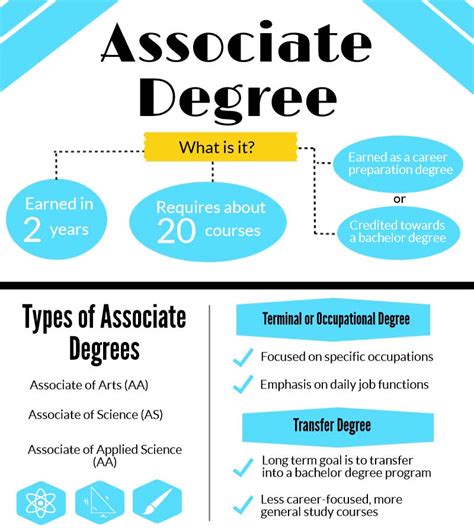Pursuing an associate’s degree can be a significant milestone in your academic and professional journey. Understanding the credit requirements associated with this qualification is essential for effective planning.

The Defining Factor: Program Type
The number of credits required for an associate’s degree varies depending on the program type. Generally, there are two primary categories:
- Associate of Arts (A.A.) or Associate of Science (A.S.): These degrees typically require 60-64 credits.
- Associate of Applied Science (A.A.S.) or Associate of Applied Business (A.A.B.): Designed for career-focused fields, these degrees usually demand 72-80 credits.
Breakdown of Credits
Associate’s degree programs typically consist of a combination of core courses, electives, and general education requirements. Here’s a general distribution:
- Core Courses: 25-30 credits
- Electives: 15-20 credits
- General Education: 20-30 credits
Core Courses
Core courses form the foundation of the associate’s degree and typically include subjects like:
- English: Focuses on writing, critical thinking, and literature.
- Math: Covers fundamental mathematical concepts, such as algebra, calculus, or statistics.
- Science: Explores scientific principles and methods.
- History: Provides an overview of historical events and their impact.
- Social Science: Examines human behavior and interactions within society.
Electives
Electives offer flexibility and allow you to explore areas of interest or develop specialized skills. You can choose electives from various fields, such as:
- Art
- Business
- Computer Science
- Health Science
- Humanities
General Education
General education requirements provide a well-rounded foundation and prepare you for success in your future endeavors. These courses include:
- Communication: Emphasizes effective communication skills, including writing, speaking, and listening.
- Critical Thinking: Develops logical reasoning, problem-solving, and critical analysis abilities.
- Technology Literacy: Enhances proficiency in using technology for research, communication, and collaboration.
Common Mistakes to Avoid
- Assuming All Credits Transfer: Verify with your chosen institution to ensure that the credits you earn will transfer smoothly.
- Underestimating the Workload: Associate’s degrees require significant time and effort. Be prepared for a balance of coursework, assignments, and exams.
- Ignoring Course Prerequisites: Carefully review the prerequisites for each course to avoid unexpected delays in your academic progress.
- Neglecting Electives: Electives provide opportunities to explore interests and develop valuable skills. Don’t overlook them in your pursuit of a degree.
Pros and Cons of an Associate’s Degree
Pros:
- Increased Job Opportunities: Associates degrees qualify you for entry-level positions in various fields.
- Shorter Duration: Associate’s programs typically take only 2 years to complete, making them a more accessible option.
- Cost-Effective: Associates degrees are generally less expensive than bachelor’s degrees.
Cons:
- Limited Career Advancement: Associates degrees may provide limited opportunities for career advancement within certain fields.
- Lower Earning Potential: On average, individuals with associate’s degrees earn less than those with higher degrees.
- Potential Need for Further Education: In some cases, an associate’s degree may serve as a stepping stone to a bachelor’s degree.
Frequently Asked Questions (FAQs)
- How long does an associate’s degree take to complete? Typically 2 years, depending on the program and individual pace.
- Is an associate’s degree a good investment? It depends on your career goals and financial situation. However, it can provide a strong foundation for future opportunities.
- Can I transfer associate’s degree credits to a bachelor’s program? Yes, but it’s essential to check with the institution for transfer requirements.
- Is an associate’s degree worth more than a high school diploma? Yes, in terms of job opportunities and earning potential.
- Can I earn an associate’s degree online? Yes, many institutions offer online associate’s degree programs.
- What is the difference between an A.A. and an A.S. degree? A.A. degrees focus on liberal arts, while A.S. degrees prepare students for specific career fields.
- How much do associate’s degree programs cost? Tuition and fees vary by institution, but the average cost ranges from $10,000 to $30,000.
- What are the highest-paying jobs for individuals with associate’s degrees? According to the Bureau of Labor Statistics, registered nurses, dental hygienists, and radiation therapists are among the top earners.
